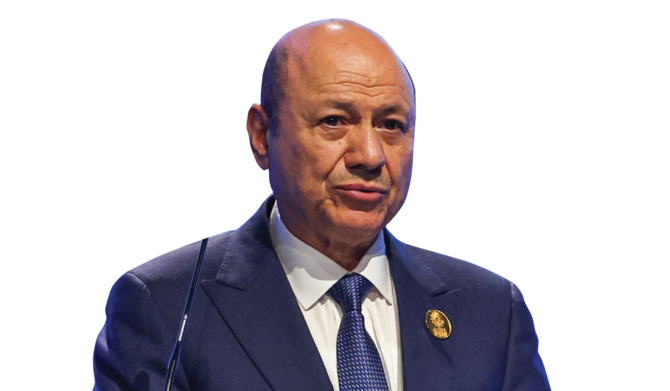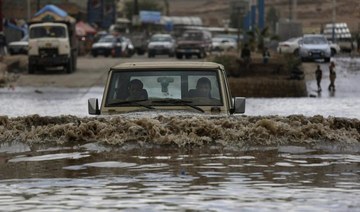AL-MUKALLA: Rashad Al-Alimi, chairman of Yemen’s Presidential Leadership Council, said that the eight-member council is now more cohesive and committed to achieving its objectives of ending the Houthis’ rebellion and alleviating Yemen’s humanitarian crisis one year after its formation.
Al-Alimi, speaking to Yemenis on the first anniversary of the council’s creation on Friday, vowed to restore state institutions and offer more concessions to achieve peace in Yemen, noting that the council has endured difficult times that threatened its unity over the past year.
“The Presidential Council was put through rigorous tests for an entire year, and today it is more coherent and adheres to the legitimate goals and aspirations of its people in building an inclusive civil state based on justice, equality, respect for human rights, public freedoms, ensuring women’s participation, and good neighborliness,” the Yemeni leader said in a statement carried by the official news agency SABA.
Al-Alimi threatened to use military force to expel the Houthis from Sanaa and other areas of Yemen under their control if the Yemeni militia did not embrace current mediation efforts to end the war.
FASTFACT
Majed Fadhail, a member of the government’s delegation to prisoner exchange negotiations, said that the prisoner swap procedure would commence on April 14 rather than April 11, as the International Red Cross requested additional time to corroborate identities due to a large number of detainees.
“We continue to bear responsibility for relieving suffering and restoring state institutions, whether through peace or war.”
Al-Alimi also thanked Saudi Arabia, the UAE, Gulf Cooperation Council states, Arab nations, and the international community for their support of the council, reiterating the council’s commitment to achieving “sustainable peace.”
In April of last year, former Yemeni President Abed Rabbo Mansour Hadi transferred his powers to the council and charged it with running the country and engaging in peace negotiations with the Houthis.
The council is made up of prominent military commanders, past and present governors, tribal leaders and politicians, and has successfully pulled together significant anti-Houthi groups under its roof.
The official news agency ran an editorial describing the council’s accomplishments, saying that members of the council who had rarely seen eye to eye in the past had abandoned fighting and engaged in “constructive” dialogues to ease the humanitarian crisis and restore state bodies from the Houthis.
According to SABA, the council also reactivated state entities in Aden, Yemen’s temporary capital, by repairing buildings and approving their budgets, reshuffled the Supreme Judicial Council, reopened courts, and restructured the military and security services.
Economically, the council authorized a variety of reforms that slowed the fast depreciation of the Yemeni riyal, increased revenues, lowered the budget deficit, and drew $3 billion in financial help from Saudi Arabia and the UAE.
Critics, however, say that a year after the council’s formation, its members have not been able to remain permanently in Aden, nor have they been able to unify armed groups in Aden and other areas, and the humanitarian crisis in the country continues to worsen despite the council’s pledge to alleviate it.
Separately, Majed Fadhail, a member of the government’s delegation to prisoner exchange negotiations, said that the prisoner swap procedure would commence on April 14 rather than April 11, as the International Red Cross requested additional time to corroborate identities due to a large number of detainees.
Last month, the Yemeni government and the Houthis agreed to exchange over 800 captives during the holy month of Ramadan.
This was the second significant prisoner exchange between Yemen’s warring factions since the outbreak of the war in late 2014.



























